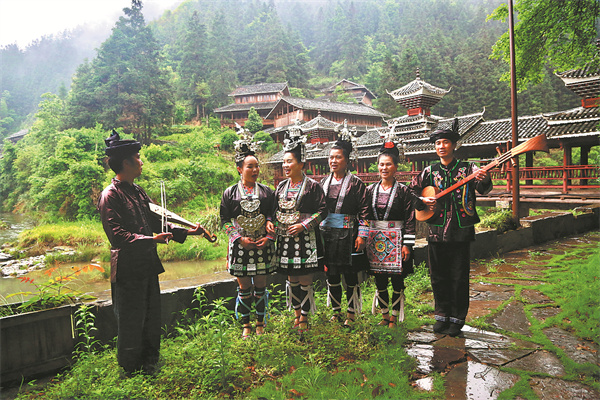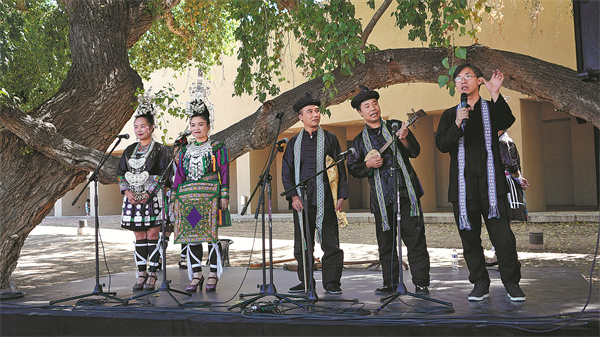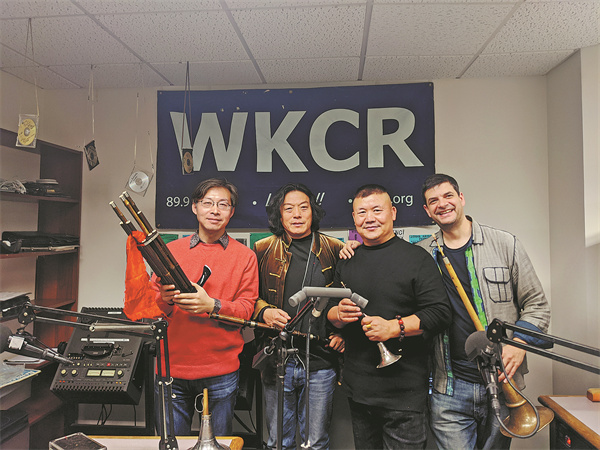
Album cover of Everyone Listen Close by the Yandong Grand Singers.[Photo provided to China Daily]
Five years ago in a quaint village in Guizhou province's Yandong township, a troupe comprising musicians of the Dong ethnic group stood on a covered bridge, singing out their iconic Grand Songs dedicated to the greatness of nature.
Mostly a cappella melodies interwoven with uninhibited improvisations, they sang of their hometown, the picturesque landscapes and the longing for love, echoed by the subtle sounds of rainfall, flowing water and wildlife.
Standing by their side and holding a portable recorder was ethnomusicologist and music curator Mu Qian, who wanted to preserve their singing in its purest form and take it to places far away.
He successfully realized his vision — not only were the recordings published on an album titled Everyone Listen Close, the Yandong Grand Singers group was also invited on a tour in the United States, where the album was well received and was exchanged as a token of friendship.
Much more than just music, the Grand Song represents an age-old tradition practiced by almost everyone of the Dong ethnic group. A children's choir receives training from experienced singers. When they grow up they join the village's various choirs, often divided by gender and age.
At festive and social occasions, the choirs can be seen donning elaborate ethnic attire and performing at the drum tower in their respective villages, often the center of the community and where public events are held. The singers imitate natural sounds and extol the beauty of nature, or sing antiphonally with another choir, expressing a yearning for love.
Without the need of a conductor, each choir comprises at least two vocal sections. Most of the singers take part in the bass section of the singing, and less than three singers in the treble section make improvisations based on the main melody.
Mu's bond with the art form began in 2007, when he worked as a music journalist and went on a field trip to Guizhou's Liping county, a core settlement for the Dong people and where he learned Liping's Yandong township was home to many singers.

The Yandong Grand Singers perform in Guizhou province's Yandong township in 2019.[Photo provided by Mu Qian/For China Daily]
"Whenever I research a music form, I wish to find such locales where the traditions are still thriving," Mu says.
"In Yandong, a lot of people are still singing Grand Songs. It means that the tradition is still very vibrant there. It exists as more than just an intangible cultural heritage, but as an integral part of people's lives."
He spent four days in Yandong, where he met and befriended many local singers, chatting with them while observing their daily antiphonal performances at the drum tower. It was on this trip that he first recorded some of their singing.
"The Grand Song is an orally transmitted polyphonic type of music. The singers are able to master intricate harmonies without the need of a musical score, with bright female voices contrasting with resonant male voices. It stands out as one of the world's distinctive musical forms," he says.
"It is so closely connected with the lives of the Dong people. A lot of their singing techniques are derived from imitating sounds of the natural world, which can provide inspiration for philosophical thoughts originating from music."
In a bid to enable more people to learn about this unique musical tradition, he recommended the Yandong choir to the World Music Shanghai Festival in 2013, where four concerts were staged across the city.

Ethnomusicologist and music curator Mu Qian (right) and the Yandong Grand Singers toured five American cities.[Photo provided by Yang Wenliang/For China Daily]
The festival's lineup also included the Eva Quartet from Bulgaria, who specialize in Bulgarian folk polyphonic singing. After seeing the Yandong Grand Singers' performance, Eva Quartet's manager referred the choir for concerts in Germany's Leipzig in 2015.
It started a chain reaction and, over the years, the artistry of the Yandong Grand Singers became more globally recognized — a music festival organizer saw the Leipzig performance of Yandong Grand Singers online and contacted Mu to invite the troupe to perform in the US.
In preparation for the troupe's US tour, Mu was commissioned by Dutch record label Pan Records to record an album, so, after 12 years, he returned to Yandong in 2019.
"I had listened to many recordings of the Dong Grand Songs, all recorded in studios. Personally, these recordings, produced in an industrialized setting, sever the connection between the music and the land it grew out of, and many subtle details are lost in the process, so I hoped to record the album in the environment where the singers live," Mu says.
He and the singers experimented with different settings, including at the singers' homes and the village's various venues, before deciding on making the records on a bridge with pavilion structures in Yandong's Tongguan village.
The bridge's location ensures an environment undisturbed by the noises of construction and transportation, and its semi-open structure allows for a natural amount of reverberation. The surroundings were so tranquil that occasionally, natural sounds such as rainfall, the flowing of the river and chirping insects can be heard on some tracks.
In contributing to the research and promotion of the Dong culture, Mu took an academic approach to the album, adopting both transcribed Dong language and English for the liner notes and lyrics, which offers the audience a comparative listening experience.

Mu (left) promotes Chinese folk music at a radio station in the United States.[Photo provided to China Daily]
The total of 18 tracks were selected as representative pieces from the vast Grand Song repertoire, which encompass different themes and styles, including those featuring catchy melodies or artful techniques, as well as both a cappella pieces and songs accompanied by ethnic instruments — govkgis and biichav (two kinds of lute).
"The selected Grand Songs on the album showcase the rich musicality of this tradition. Each piece has a distinct melody and structure, yet the pieces all share some similarities," Han Mei, founding director of the Center for Chinese Music and Culture at the Middle Tennessee State University in the US, writes in a review of the album.
"With its well-written liner notes, this recording presents a beneficial introduction to Dong singing and will be a valuable resource for academic courses, libraries, and music collections."
In September 2019, Mu and the Yandong Grand Singers took the album on a tour to five US cities, hosting 10 concerts and workshops that introduced the nature and culture of the Dong ethnic group and taught the attendees the music and its singing methods.
As Mu recalls, at the tour's last stop, the University of Kentucky, he jokingly urged the audience to buy up all of the troupe's CDs and merchandise, and to his amazement the audience actually did.
The album continued to be popular worldwide — it was selected as the Best of Asia and Pacific album of the 2019-2020 season by the Transglobal World Music Chart, was broadcast on dozens of global radio stations and launched on more than 50 online music service providers.
Mu's effort in promoting the Grand Song as well as other Chinese folk and ethnic music genres continues. He has been introducing Chinese music on international radio shows and publishing articles in music magazines, as well as on his own official WeChat account. Last year, he curated an exhibition about the Grand Song, Splendid Kam Songs, commissioned by the Leisure and Cultural Services Department of Hong Kong.
"I have a dream, that Dong Grand Songs will be included in music textbooks found in global middle and primary schools, so that people from all around the world will learn to sing them," Mu says.
"Ethnic music is the root of Chinese culture and an emblem of the Chinese identity on the global stage. Facilitating international cultural exchange through music requires collective efforts from various sectors of society, including the government, scholars, musicians and media. It is also essential to enhance the education of traditional music, so that everyone takes pride in our ethnic music heritage."